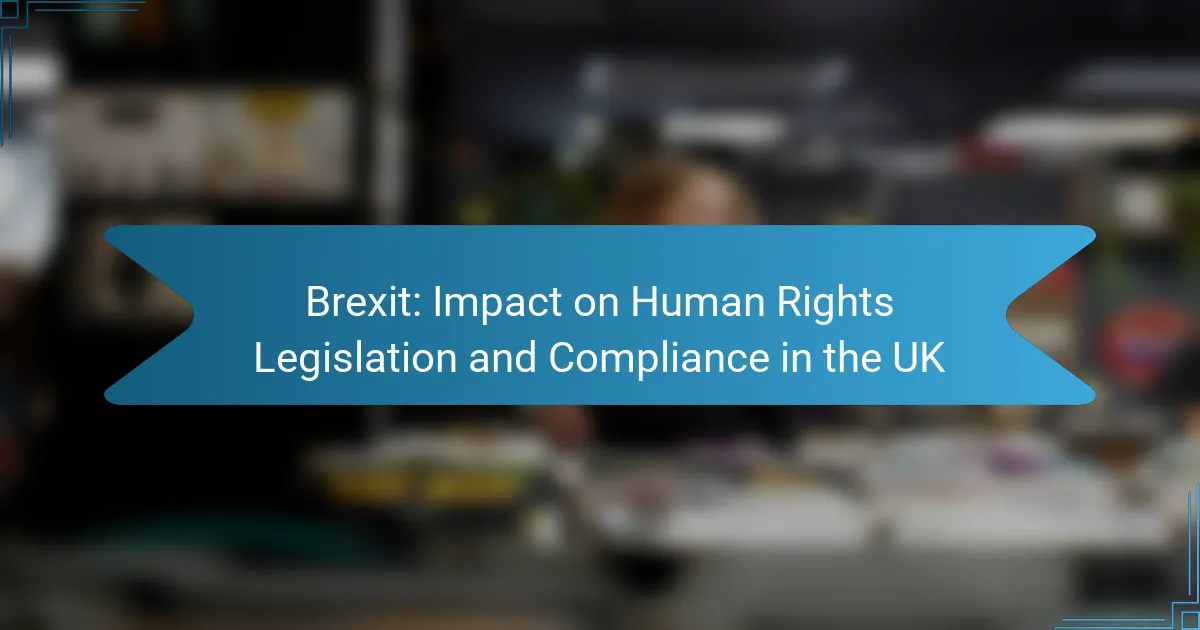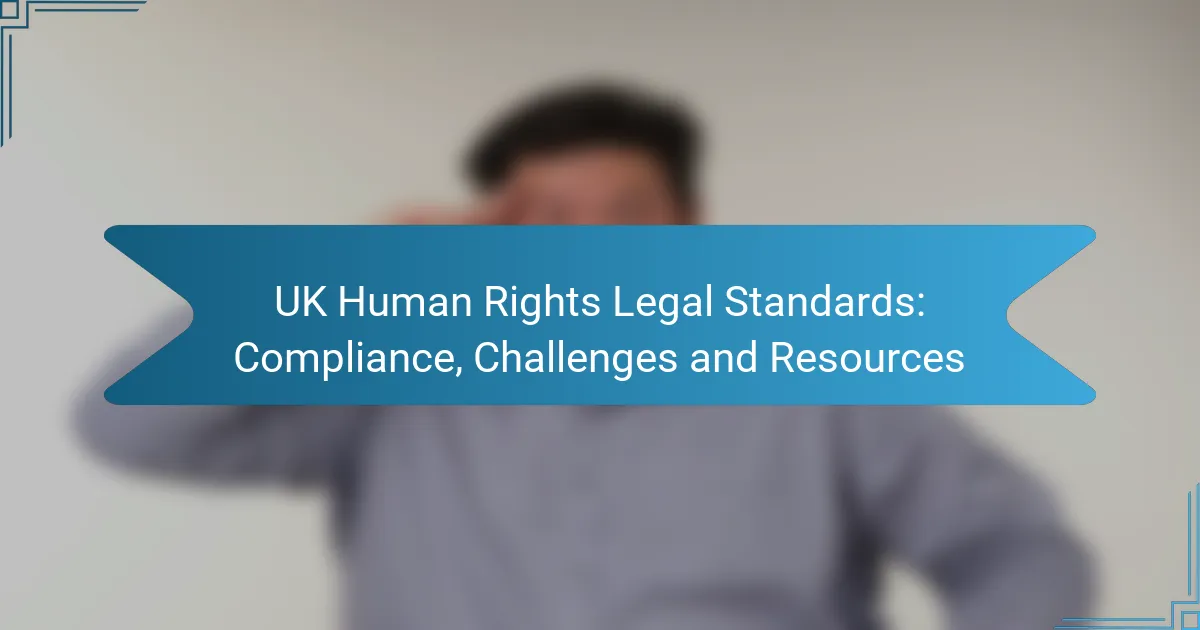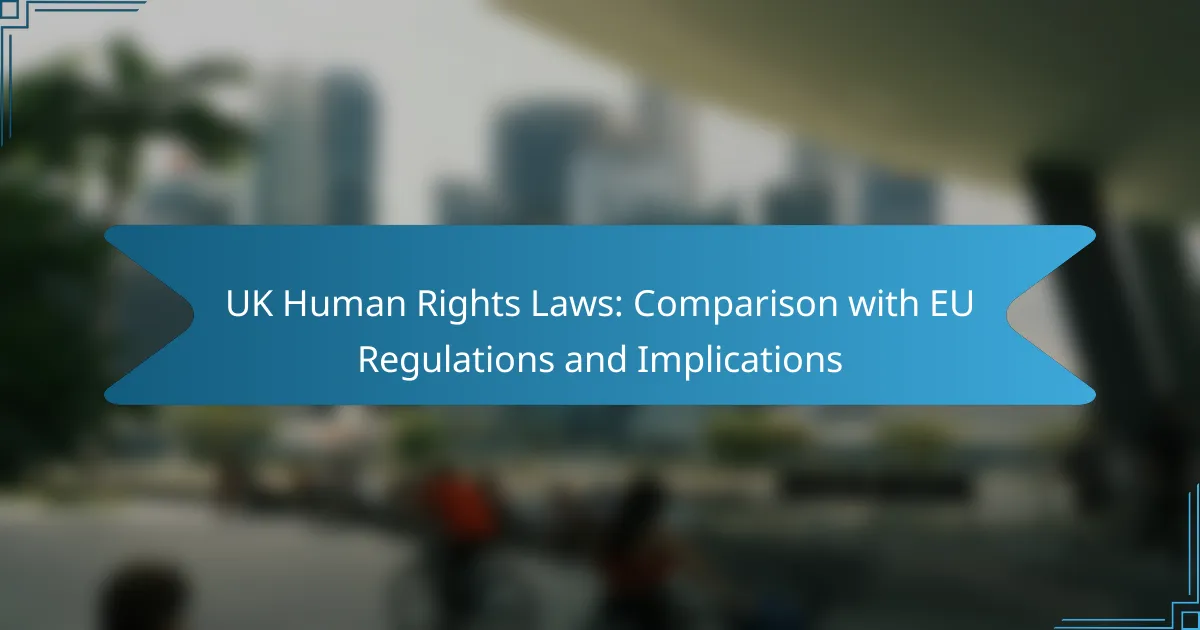Brexit has ushered in substantial changes to human rights legislation in the UK, particularly as the country moves away from EU frameworks that previously shaped its legal landscape. This shift raises critical concerns regarding the protection of workers’ rights, data privacy, and the status of EU citizens, prompting a re-evaluation of compliance with international human rights standards. To address these challenges, the UK must consider adopting international treaties and strengthening domestic laws to ensure robust human rights protections moving forward.
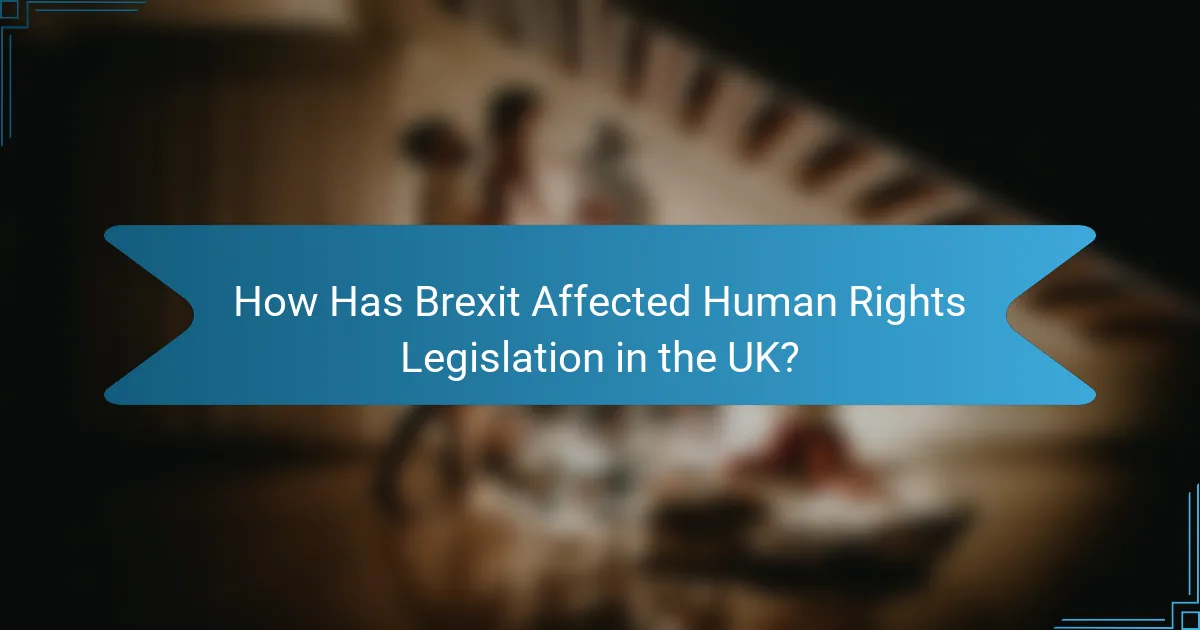
How Has Brexit Affected Human Rights Legislation in the UK?
Brexit has led to significant changes in human rights legislation in the UK, particularly through the withdrawal from EU frameworks and the potential re-evaluation of existing laws. The departure from the EU has raised questions about the future of human rights protections that were previously aligned with EU standards.
Withdrawal from EU Charter of Fundamental Rights
The UK’s exit from the EU means it is no longer bound by the EU Charter of Fundamental Rights, which provided a comprehensive framework for human rights protections. This withdrawal raises concerns about the potential weakening of rights related to privacy, non-discrimination, and workers’ rights that were previously safeguarded under EU law.
Without the Charter, the UK may have more flexibility to amend or repeal laws that protect these rights. However, this could lead to inconsistencies in human rights protections across different jurisdictions within the UK.
Changes to UK Human Rights Act 1998
Post-Brexit, there have been discussions about reforming the Human Rights Act 1998, which incorporates the European Convention on Human Rights (ECHR) into UK law. Proposed changes could limit the scope of the Act, affecting how individuals can seek justice for human rights violations.
Potential reforms may include restricting the ability of UK courts to interpret ECHR rights or limiting the applicability of the Act in certain contexts. Stakeholders are concerned that such changes could undermine the protection of fundamental rights for individuals in the UK.
Impact on Northern Ireland Protocol
The Northern Ireland Protocol, part of the Brexit agreement, has implications for human rights in the region, particularly regarding the Good Friday Agreement. This agreement relies on certain human rights protections that were previously aligned with EU standards.
Changes to the Protocol could affect the enforcement of rights related to equality and non-discrimination in Northern Ireland. Ensuring that these rights are maintained is crucial for the stability and peace established by the Good Friday Agreement.
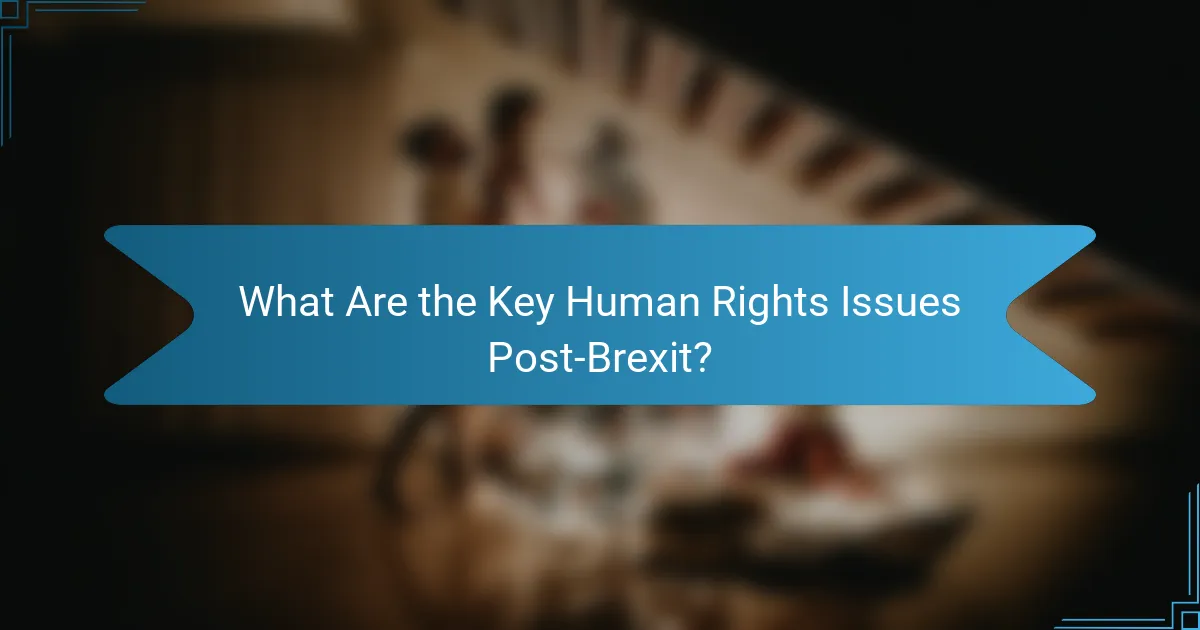
What Are the Key Human Rights Issues Post-Brexit?
Post-Brexit, the UK faces significant human rights issues, particularly concerning the protection of workers’ rights, data privacy, and the status of EU citizens residing in the UK. These areas have raised concerns about compliance with international human rights standards and the potential erosion of rights previously safeguarded under EU law.
Workers’ Rights Concerns
Following Brexit, there are apprehensions regarding the future of workers’ rights in the UK. The removal of EU regulations may lead to a weakening of protections related to working hours, minimum wage, and health and safety standards. Employers may seek to exploit this uncertainty, potentially compromising the rights of employees.
To address these concerns, workers should stay informed about changes in legislation and advocate for the maintenance or enhancement of existing rights. Engaging with trade unions and participating in discussions about labor laws can help ensure that workers’ interests are represented.
Data Protection and Privacy Rights
Data protection and privacy rights have become critical issues post-Brexit, particularly with the UK’s departure from the EU’s General Data Protection Regulation (GDPR). The UK has established its own data protection framework, which may diverge from EU standards, raising concerns about the adequacy of protections for personal data.
Businesses operating in the UK must ensure compliance with the UK GDPR while also considering the implications of transferring data between the UK and EU. Organizations should regularly review their data handling practices and seek legal advice to navigate the evolving landscape of data protection.
Rights of EU Citizens in the UK
The rights of EU citizens living in the UK have been significantly affected by Brexit. Many EU nationals are required to apply for settled or pre-settled status under the EU Settlement Scheme to maintain their rights to live and work in the UK. Failure to secure this status could result in loss of residency and associated rights.
EU citizens should ensure they complete their applications before the deadline and keep abreast of any changes to immigration policies. It is advisable to seek assistance from legal experts or community organizations specializing in immigration to navigate this complex process effectively.

How Can the UK Ensure Compliance with Human Rights Standards?
The UK can ensure compliance with human rights standards by adopting international treaties, strengthening domestic laws, and engaging with human rights organizations. These actions create a robust framework that aligns national policies with global human rights norms.
Adopting International Human Rights Treaties
Adopting international human rights treaties is essential for the UK to align its legal framework with global standards. Treaties such as the European Convention on Human Rights (ECHR) provide a foundation for protecting individual rights and freedoms.
By ratifying and implementing these treaties, the UK commits to upholding specific human rights obligations. This includes ensuring that domestic laws do not contradict treaty provisions, thereby reinforcing the protection of rights within the country.
Strengthening Domestic Legislation
Strengthening domestic legislation is crucial for effective human rights compliance in the UK. This can involve revising existing laws to enhance protections or introducing new laws that address gaps in rights coverage.
For instance, laws related to anti-discrimination, privacy, and freedom of expression should be regularly reviewed and updated to reflect current human rights standards. Engaging with stakeholders, including legal experts and civil society, can help identify necessary reforms.
Engaging with Human Rights Organizations
Engaging with human rights organizations is vital for the UK to stay informed about best practices and emerging issues. These organizations often provide valuable insights and recommendations that can guide policy development and implementation.
Collaboration can take various forms, such as consultations, partnerships on specific initiatives, or participation in joint advocacy efforts. By fostering these relationships, the UK can enhance its human rights compliance and responsiveness to public concerns.

What Are the Implications for Businesses in the UK?
Businesses in the UK face significant implications post-Brexit, particularly regarding human rights legislation and compliance. Companies must navigate changes in employment law, data protection costs, and the impact on supply chains and labor rights.
Changes in Employment Law
Post-Brexit, employment law in the UK may diverge from EU standards, affecting worker rights and protections. Businesses should be aware of potential changes to regulations regarding working hours, minimum wage, and anti-discrimination laws.
Employers may need to review contracts and policies to ensure compliance with any new legislation. Staying informed about updates from the UK government will be crucial to avoid legal pitfalls.
Compliance Costs for Data Protection
Data protection compliance costs may rise as the UK establishes its own regulatory framework separate from the EU’s General Data Protection Regulation (GDPR). Businesses will need to assess their data handling practices and potentially invest in new systems to meet UK standards.
Companies should consider conducting audits to identify gaps in compliance and allocate budget for necessary changes. Engaging with legal experts can help navigate the evolving landscape effectively.
Impact on Supply Chains and Labor Rights
Brexit may disrupt supply chains, leading to increased costs and delays. Businesses must evaluate their supply chain strategies, particularly regarding labor rights and ethical sourcing, as regulations may shift.
Companies should prioritize transparency and ensure that their suppliers adhere to labor rights standards. Regular assessments of supply chain practices can mitigate risks associated with non-compliance and enhance corporate responsibility.
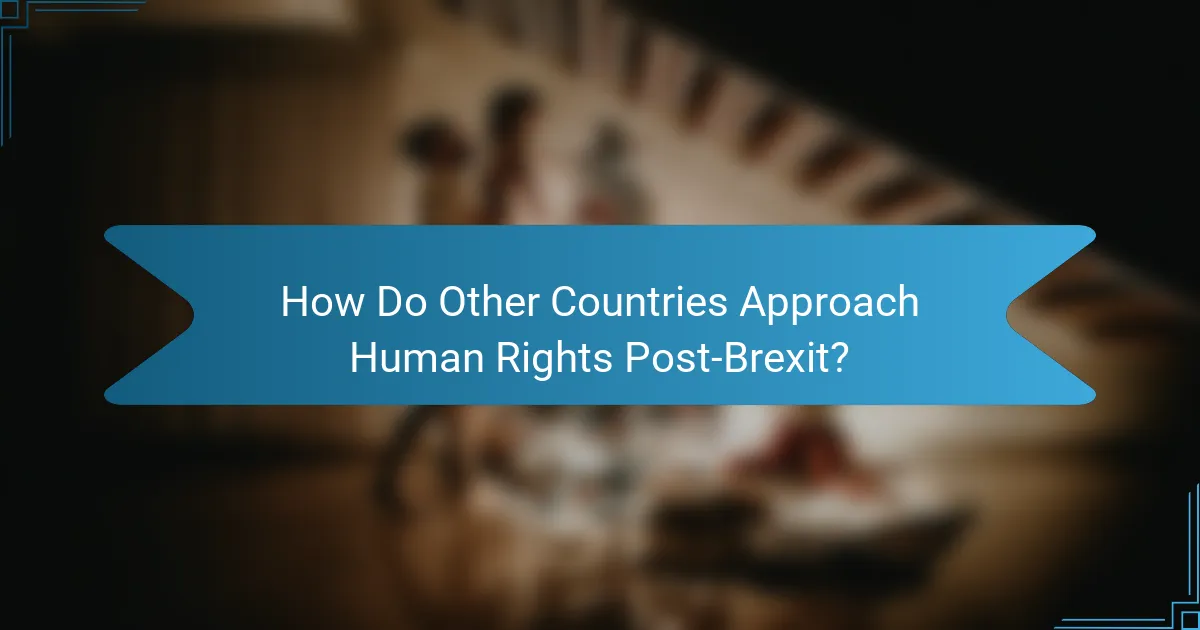
How Do Other Countries Approach Human Rights Post-Brexit?
Post-Brexit, countries have varied approaches to human rights, often influenced by their own legal frameworks and international commitments. Many nations continue to uphold strong human rights protections, while others may adopt more flexible interpretations, impacting compliance and enforcement.
Comparative Analysis with EU Member States
EU member states generally maintain robust human rights legislation, largely influenced by the Charter of Fundamental Rights of the European Union. Countries like Germany and France have comprehensive legal frameworks that protect civil liberties, often with strong judicial oversight.
In contrast, the UK has opted to diverge from EU standards, which may lead to differences in human rights protections. For instance, while the EU mandates strict adherence to human rights norms, the UK may prioritize national sovereignty, potentially resulting in weaker enforcement mechanisms.
Lessons from Non-EU Countries
Non-EU countries such as Norway and Switzerland, while not bound by EU regulations, still adhere to strong human rights standards through international treaties and domestic laws. These nations often demonstrate that robust human rights protections can coexist with non-EU status, emphasizing the importance of political will and public support.
Additionally, countries like Canada and Australia show that maintaining a balance between national interests and human rights is crucial. They provide frameworks that allow for flexibility while ensuring that fundamental rights are not compromised, offering valuable lessons for the UK in its post-Brexit landscape.
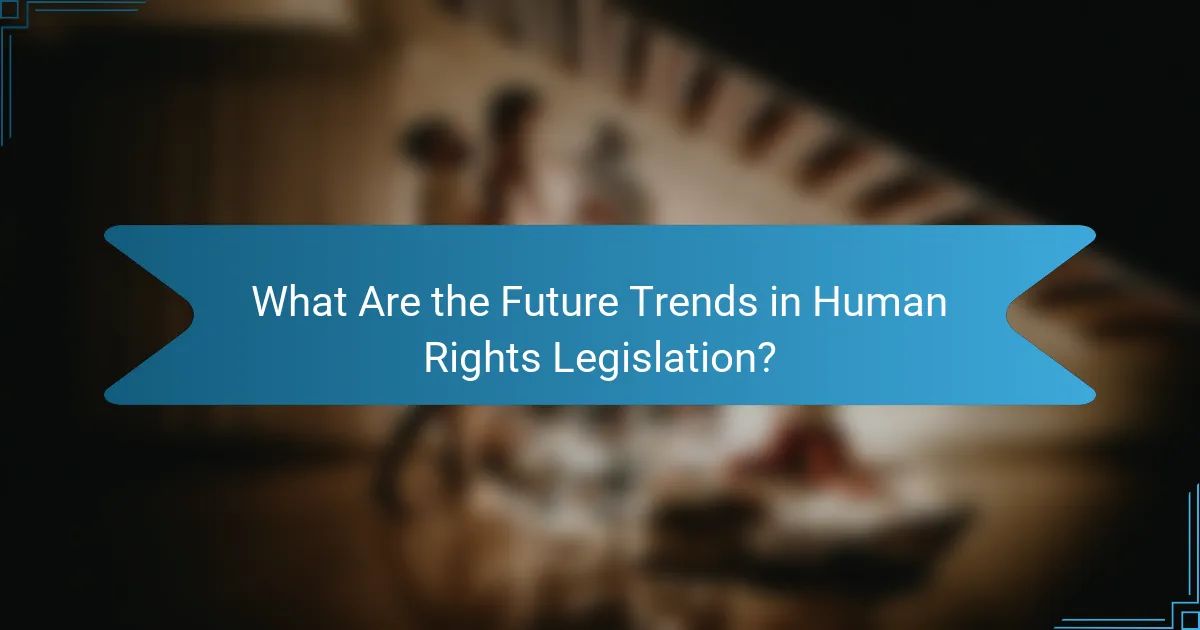
What Are the Future Trends in Human Rights Legislation?
Future trends in human rights legislation in the UK are likely to focus on balancing national sovereignty with international obligations. As Brexit reshapes the legal landscape, there may be shifts towards more localized interpretations of human rights, potentially leading to both reforms and challenges.
Potential Reforms to the Human Rights Act
Reforms to the Human Rights Act (HRA) may include proposals to limit the scope of rights or to enhance parliamentary sovereignty over judicial interpretations. Discussions around introducing a British Bill of Rights could redefine how human rights are protected and enforced in the UK.
Any potential changes will need to consider the implications for existing protections and the UK’s commitments under international law. Stakeholders should monitor these developments closely, as they could significantly impact individuals’ rights and legal recourse.
Emerging Human Rights Challenges
Post-Brexit, the UK faces emerging human rights challenges, particularly concerning immigration and asylum policies. Changes in legislation may affect the rights of migrants and refugees, potentially leading to increased vulnerability for these groups.
Additionally, issues related to privacy and data protection are becoming more prominent, especially with the rise of surveillance technologies. Advocates must remain vigilant to ensure that human rights are upheld in the face of these evolving challenges.
Role of Technology in Human Rights Compliance
Technology plays a dual role in human rights compliance, acting as both a tool for protection and a potential source of violations. Digital platforms can enhance transparency and accountability, but they also raise concerns about privacy and data misuse.
Organizations should adopt robust data protection measures and ethical guidelines to navigate these complexities. Engaging with technology responsibly can help ensure that human rights are respected and promoted in the digital age.
